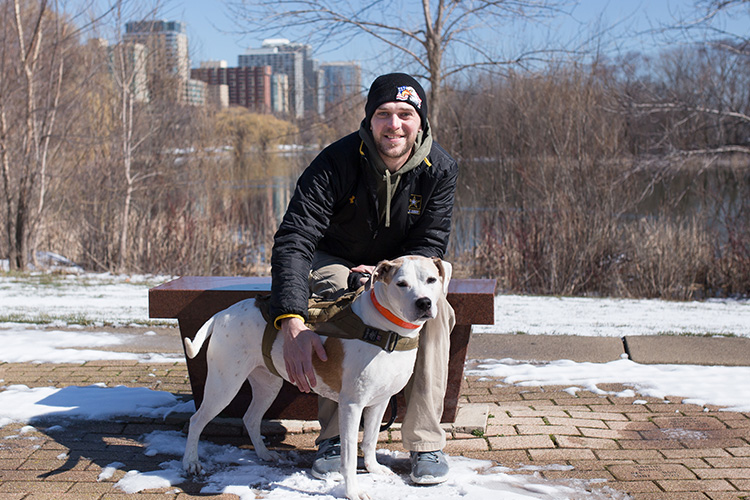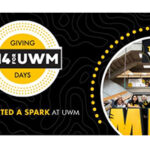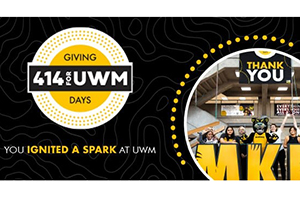Bella, a handsome mixed-breed dog with short brown and white hair, sits quietly at Andy Smith’s feet. In soft and reverent tones, he speaks about the service dog’s role as a companion and an emotional guardian. Occasionally, he’ll join her on the floor for a little extra contact.
Smith is an Army veteran of two military tours in Iraq, and the post-combat adjustment back to civilian life was difficult. Bella not only helped it along, but Smith will tell you his dog literally saved his life.
Their story inspired an inaugural animal therapy event at UWM, “De-stress with Dogs.” It’s open to all UWM students and will be held 3-4:30 p.m. Tuesday, April 5, in the Golda Meir Library’s Daniel N. Soref Learning Commons. The event is co-sponsored by the Accessibility Resource Center, the Military and Veterans Resource Center, and the UWM Libraries. The dogs are provided by Health Heelers.
Smith has become a strong advocate for service dogs and encourages fellow veterans to take advantage of their therapeutic value. “I’ve been trying to spread the word,” the Muskego native says. “I want to show people how good an influence dogs can be on veterans.”
Ann Kowaliczko, a senior counselor at the Accessibility Resource Center, was part of an informal group that had advocated bringing therapy dogs to campus as a stress reliever for students, but had been stymied by insurance technicalities. Smith gave her the nudge she needed to give it another try.
“When I met Andy, he mentioned his service dog and asked about therapy dogs at UWM,” Kowaliczko recalled. He told her how he’d initiated an informal pet therapy program while attending Colorado Technical University. And though he was reluctant to bring Bella to the UWM campus, he said he’d enthusiastically participate in a therapy dog program.
“Because of that conversation,” Kowaliczko said, “I thought, ‘We have to get this started again.’” Insurance and other logistical hurdles were cleared this time, paving the way for “De-stress with Dogs” and hopes that the inaugural event leads to future ones.
That would suit Smith just fine. He mustered out of the Army as a sergeant in 2010 and settled in Colorado Springs, Colorado. There, he earned an associate degree in business at Colorado Technical University and received dog trainer certification from Animal Behavior College. He returned to Muskego in 2014, and enrolled in UWM’s Lubar School of Business in the fall of 2015.
All the while, Bella was there to help Smith. “My girlfriend, Monique, fell in love with Bella, too,” Smith said. Occasionally, the dog acts as a bridge between Smith and Monique: In times of stress or conflict, their affection for Bella is something they always have in common. And Bella defuses tensions in other ways, too.
“A trained dog knows to alert you when you’re starting to get stressed out,” Smith said. “The dogs know that they’re there to make sure you’re OK.” That’s why he emphasizes how important it is that veterans – or anyone dealing with depression or anxiety – get their dogs certified.
Smith also feels that the public needs to be more aware of how service dogs can help veterans, while simultaneously noting that people need to respect a veteran’s privacy. Sometimes, strangers will see Bella and learn that Smith is a military veteran, then start asking unwelcome questions about the nature of his combat experiences. “It’s one reason I haven’t wanted to bring Bella to campus with me,” Smith said.
But Smith definitely sees the benefits of allowing trained animals on campus, and he’s certain the animal therapy session will give students a feeling of comfort and happiness.
“I guarantee they’ll go out with a smile their faces,” he said, and did so with a smile of his own.







